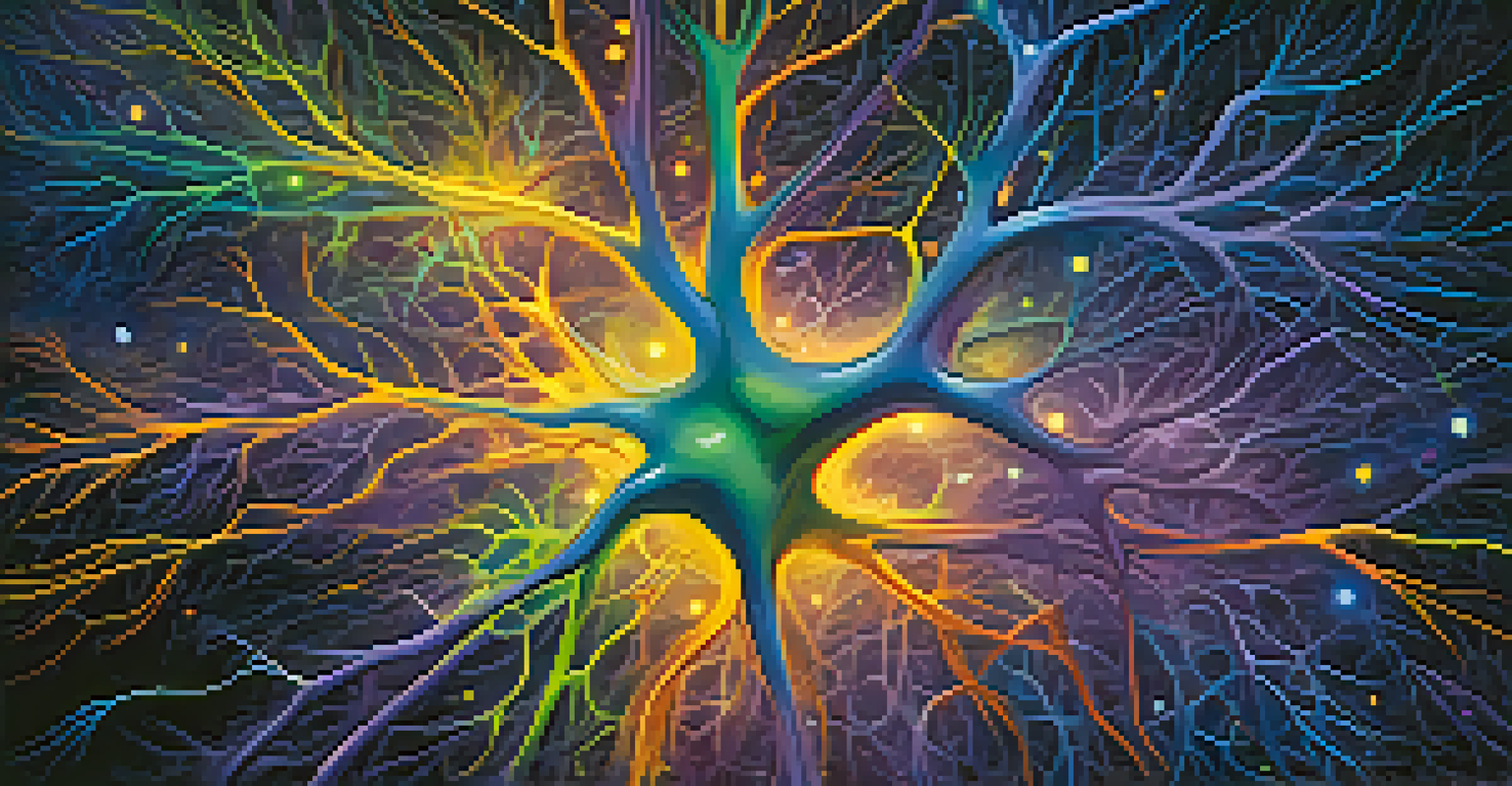Psychedelics: Unlocking the Mysteries of Consciousness

What Are Psychedelics and Their Historical Context?
Psychedelics are substances that alter perception, mood, and various cognitive processes. They have been used for thousands of years in spiritual and healing rituals, particularly among indigenous cultures. For instance, the use of ayahuasca in the Amazon has long been a cornerstone of shamanistic practices, highlighting the deep-rooted connection between psychedelics and human consciousness.
Psychedelics are a means to access the deeper layers of the mind, allowing for exploration of the self and the universe.
In the mid-20th century, psychedelics gained attention in Western societies for their potential therapeutic benefits. Researchers like Timothy Leary and Richard Alpert (later known as Ram Dass) explored how these substances might expand consciousness and lead to personal insights. However, the subsequent backlash and legal restrictions stifled much of this research until recently.
Today, there's a resurgence in interest as studies reveal the potential of psychedelics in treating mental health issues like depression, PTSD, and addiction. This renewed focus invites deeper inquiries into how these substances might unlock the mysteries of our consciousness.
How Psychedelics Affect the Brain's Functioning
Psychedelics primarily work by interacting with serotonin receptors in the brain, particularly the 5-HT2A receptor. This interaction can lead to enhanced neural connectivity, a phenomenon often described as a 'reset' for the brain. Imagine a crowded highway where traffic flow is suddenly optimized, allowing vehicles to move in previously unimagined ways.

Research using neuroimaging techniques has shown that psychedelics can foster communication between different brain regions that usually operate independently. This can lead to experiences of synesthesia, where senses blend, such as 'seeing' sounds or 'tasting' colors. Such experiences challenge our conventional understanding of sensory perception.
Psychedelics' Historical Significance
Psychedelics have been integral in spiritual and healing practices across cultures for thousands of years.
Moreover, psychedelics may reduce activity in the default mode network (DMN), a brain network associated with self-referential thoughts and the ego. This reduction can lead to feelings of interconnectedness and ego dissolution, prompting users to explore aspects of consciousness that are often hidden in everyday life.
The Therapeutic Potential of Psychedelics
Recent studies suggest that psychedelics may offer a novel approach to treating mental health disorders. For example, psilocybin, the active compound in magic mushrooms, has shown promise in alleviating symptoms of depression. This is particularly exciting because traditional treatments don’t work for everyone.
The greatest discovery of my generation is that a human being can alter his life by altering his attitude of mind.
Clinical trials have reported significant improvements in anxiety, depression, and PTSD symptoms after just a few sessions with psychedelics under professional supervision. Participants often report profound insights and emotional breakthroughs that facilitate healing. Think of it as clearing out a cluttered attic—once the dust settles, hidden treasures can be found.
However, it’s crucial to approach this therapeutic potential with caution. While the results are promising, more research is needed to fully understand the long-term effects and potential risks associated with psychedelic use. Professional guidance and controlled environments are essential to ensure safety and efficacy.
Psychedelics and the Exploration of Consciousness
Psychedelics provide a unique lens through which we can examine consciousness. Many users report experiences of profound insight, altered perception of time, and even encounters with a 'higher self.' These experiences can prompt philosophical inquiries about the nature of reality and existence.
For instance, during a psychedelic experience, individuals might feel as if they are experiencing the universe from a non-linear perspective, leading them to question the boundaries of their identity. This can foster a sense of unity with the world around them, which can be both exhilarating and unsettling.
Therapeutic Uses of Psychedelics
Recent studies reveal that psychedelics show promise in treating mental health disorders, offering new avenues for healing.
This exploration of consciousness raises intriguing questions: What is the nature of reality? How do we define our own consciousness? Psychedelics encourage users to confront these existential inquiries, often leading to a deeper understanding of themselves and their place in the universe.
Cultural Perspectives on Psychedelics
Different cultures have varying attitudes toward psychedelics, often reflecting their historical and spiritual significance. In many Indigenous cultures, psychedelics are seen as sacred tools for healing and connection to the divine. For instance, the San Pedro cactus is used in Andean ceremonies to facilitate spiritual growth.
Contrastingly, in Western societies, psychedelics have often been stigmatized and associated with counterculture movements. This stigma has impacted public perception and policy, leading to a complex relationship with these substances. In recent years, however, there's been a shift towards recognizing their potential benefits, sparking discussions about drug reform.
Understanding these cultural perspectives can help bridge the gap between different attitudes towards psychedelics. By acknowledging their historical contexts and therapeutic potential, we can foster a more nuanced conversation about their place in modern society.
The Role of Set and Setting in Psychedelic Experiences
The concept of 'set and setting' is vital in understanding how psychedelics affect individuals. 'Set' refers to the mindset or mental state of the user, while 'setting' pertains to the physical and social environment in which the experience occurs. Both factors can significantly influence the outcome of a psychedelic experience.
For example, a person using psychedelics in a safe, supportive environment with trusted friends is more likely to have a positive experience than someone in a chaotic or unsafe setting. This is akin to going to a concert: the right atmosphere can elevate the experience from good to unforgettable.
Importance of Set and Setting
The mindset and environment during psychedelic experiences play a crucial role in determining their outcomes.
Recognizing the importance of set and setting can help individuals prepare for psychedelics more thoughtfully. By cultivating a positive mindset and selecting an appropriate environment, users can maximize the potential benefits and minimize the risks associated with their experiences.
The Future of Psychedelics in Research and Society
As the stigma surrounding psychedelics continues to diminish, we are entering an era of renewed research and exploration. Institutions like Johns Hopkins University and Imperial College London are leading the charge in studying the therapeutic benefits of psychedelics. This research could reshape our understanding of mental health and consciousness.
Moreover, as more states and countries consider decriminalizing or legalizing psychedelics, there is potential for broader societal acceptance. This shift could lead to new frameworks for integrating psychedelics into mental health treatment, education, and even spirituality. Imagine a future where psychedelics are part of standard therapeutic practices.

However, as we move forward, it is essential to approach this progress responsibly. Continued education, research, and dialogue will be crucial in ensuring that the use of psychedelics is safe and beneficial for society. By doing so, we can unlock the mysteries of consciousness while respecting the complexities of these powerful substances.